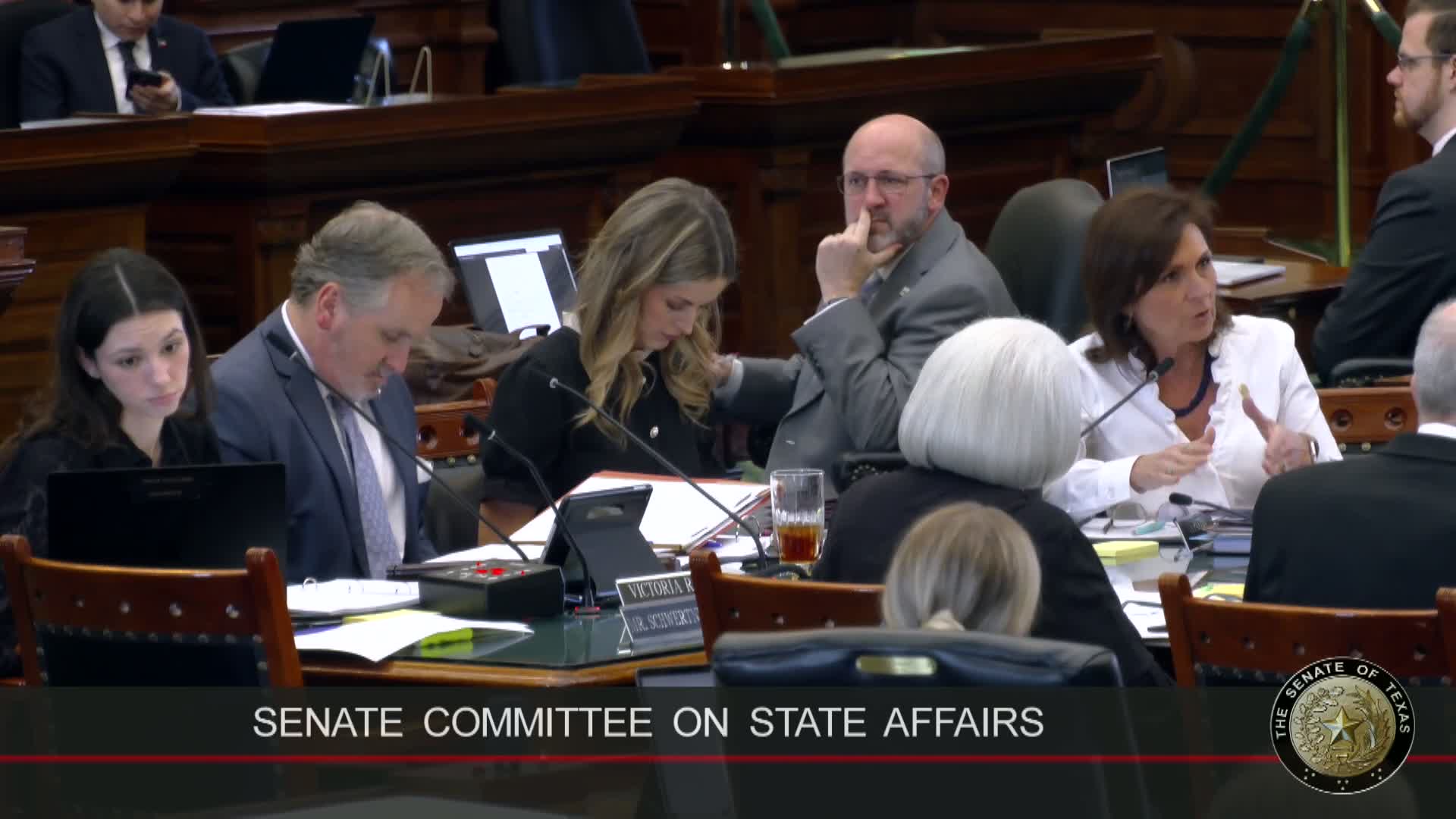Senate Committee on State Affairs Hears Bills on Homeless IDs, Foreign-funded Lawsuits and Election Security; All Left Pending
Get AI-powered insights, summaries, and transcripts
Subscribe
Summary
The Senate Committee on State Affairs met Monday morning to take testimony on a slate of bills including a measure to provide certified birth certificates at no cost to people experiencing homelessness, a bill requiring disclosure of foreign or adversarial funding in certain lawsuits involving defense contractors, proposals to rename the Gulf of Mexico in state documents, and several election-related bills; committee members opened public testimony and left the measures pending.
The Senate Committee on State Affairs met Monday morning to take testimony on a slate of bills including a measure to provide certified birth certificates at no cost to people experiencing homelessness, a bill requiring disclosure of foreign or adversarial funding in certain lawsuits involving defense contractors, proposals to rename the Gulf of Mexico in state documents, and multiple election-related bills aimed at audits, voter-roll maintenance and equipment security. Committee members opened public testimony on each measure and left the bills pending for further consideration.
The most detailed discussion centered on Senate Bill 801, which would direct the Department of State Health Services and local registrars to issue a certified birth certificate on request without charge to an individual experiencing homelessness. Senator Roland Gutierrez (authorizing bill text acknowledged in testimony as Senate Bill 801) told the committee that birth records are often required to obtain IDs, driver’s licenses, housing and employment. “Without them, you can’t get an ID, a state ID,” the senator said, adding that the Legislative Budget Board estimated no fiscal impact to the state. Maria Benavides, president and CEO of SA Youth in San Antonio, testified the organization has served roughly 400 unhoused 18-to-24-year-olds and helped about 28 secure birth certificates and IDs; she described a client who obtained identification, completed a phlebotomy course and is now housed and working. Benavides said the cost — roughly $22 for a certified copy — and the requirement to provide a mailing address were practical barriers for people the program serves.
A second high-profile item, Senate Bill 1200, would amend discovery rules in civil litigation to require plaintiffs to disclose during discovery whether they are receiving funds from entities tied to adversarial nations when the litigation concerns activities of U.S. defense contractors. The sponsor framed the bill as a transparency measure aimed at “third-party litigation funding” that could be used to influence or delay defense-related projects. Kevin Reddington, assistant general counsel for Texans for Lawsuit Reform, told the committee the bill seeks a simple disclosure so courts and parties can assess conflicts or undue influence; his testimony cited national concern over foreign actors leveraging U.S. litigation and referenced the International Traffic in Arms Regulations (ITAR) as part of the bill’s definition for covered defense contractors.
Lawmakers also took up three related measures to change official state references to the Gulf of Mexico: Senate Bill 1410 (requiring agencies to update language in documents), Senate Bill 1717 (which the sponsor said aligns state usage with a presidential executive order), and Senate Joint Resolution 63 (proposing a constitutional conforming change). Supporters, including Chuck DeVore of the Texas Public Policy Foundation, argued that federal action through the U.S. Board on Geographic Names and federal systems such as the Geographic Names Information System have moved in that direction and that state statute should match federal usage.
On elections and administration, the committee considered several bills. Senators discussed Senate Bill 1862, which would require a new Texas registrant who has moved from another state to provide their previous address so the prior jurisdiction can be notified; supporters said the change would help other states clean voter rolls. Senate Bill 1863, which would expand procedural audits by the secretary of state and prescribe specific audit areas, drew objections from the Texas Civil Rights Project over cost and potential enforcement tools; the group’s witness said the bill carries a fiscal note near $4.2 million and warned that withholding funds from counties for audit noncompliance could hamper county election administration. Senators also discussed equipment- and chain-of-custody-focused measures, including Senate Bill 2216, which would require locked storage, security seals on voting system units and documented procedures for seal removal, and related proposals aimed at poll books and other election equipment security. Ed Johnson, affiliated with a Harris County ballot security group and formerly in county election administration, supported the audit and equipment-security measures and called them practical checks on county practices.
A narrower health-care measure, Senate Bill 2626, would direct the Texas Medical Board and the Board of Nursing to create continuing medical education (CME) on pregnancy-related emergencies for clinicians who practice obstetrics or gynecology. Supporters from Texas Right to Life and Texas Values Action said the training would reduce confusion among providers about what emergency care is permitted under state law and help ensure clinicians confidently provide life-saving treatment.
Other bills discussed included Senate Bill 506 (changing statutory standards for ballot language and petition processes) and Senate Bill 2681 (clarifying the standard for challenging a voter’s registration to allow challenges based on facts “not subject to reasonable dispute,” such as national change-of-address data). Testimony on SB 2681 split sharply: proponents said the bill would help counties clean rolls and address narrow definitions of “personal knowledge”; opponents, including the Texas Civil Rights Project, warned the standard is vague and could facilitate mass, erroneous challenges and disenfranchisement if third parties submit unverified data.
Committee leaders opened public testimony on each measure, took questions of authors and witnesses, and left the bills pending. Several resource witnesses — including Christina Atkins, director of elections for the Texas Secretary of State — answered technical questions about federal voting-system certification, Help America Vote Act (HAVA) processes and the timeline for federal updates to voting-system standards.
No floor votes or final committee actions were recorded during the hearing; committee members indicated staff and sponsorship teams would continue to refine language and return items to committee for later action.
